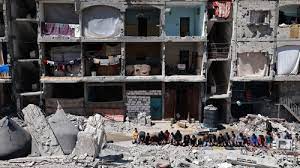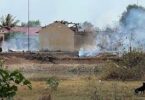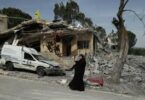GAZA (AFP): Israel’s intelligence chief is expected to participate in negotiations on Monday in Doha about a potential new Gaza truce and hostage exchange deal, a source with knowledge of the talks told AFP.
The meeting would come three days after a Hamas official said the Palestinian militant group had put forward a proposal for a six-week truce in Gaza, to be followed by a durable ceasefire.
Here is what we know about the demands of both Hamas and Israel as mediators push for a deal to end, or at least pause, the more than five-month-old war.
What does Hamas want?
The latest Hamas proposal calls for a truce of 42 days, during which it would release about 42 hostages seized during the October 7 attack on southern Israel that triggered the war, the Hamas official told AFP.
In exchange for each hostage, Hamas wants between 20 and 50 Palestinian prisoners to be released from Israeli custody.
The exchange could include women, children, elderly and ill hostages, whereas male soldiers and the bodies of dead hostages would be returned during a later, comprehensive exchange to coincide with a full ceasefire.
Hamas took about 250 Israeli and foreign hostages on October 7, more than 100 of whom were released during the only previous truce in the war, which lasted for a week in November.
Israel believes about 130 captives taken on October 7 remain in Gaza including 33 presumed dead.
Mediators had been pushing for a six-week pause during recent talks, but until Friday Hamas had insisted no further hostages would be exchanged without a permanent ceasefire and Israeli withdrawal from Gaza.
Now the militants are saying that, during a six-week truce, Israeli forces would need to withdraw from “all cities and populated areas in the Gaza Strip” and allow for the return of displaced Gazans “without restrictions”.
Hamas official Osama Hamdan told Iran-backed Hezbollah’s Al-Manar television channel in Lebanon that there was “a real opportunity” for a ceasefire.
“In the first stage, there will be a total halt to military operations, which means no overflights or troop movements” and a partial Israeli withdrawal, Hamdan said.
“After 14 days, there will be a withdrawal to the east… which means reopening the road for displaced people so that they can return.”
The Hamas proposal also calls for the flow of humanitarian aid to be ramped up to its pre-war level of around 500 trucks per day.
Once a ceasefire takes effect, Israel would also need to withdraw from Gaza and end its long-running blockade of the territory, and the deal would also address plans to reconstruct Gaza, which Hamas has ruled since 2007.
What does Israel want?
Israel has so far refused to consider withdrawing troops from Gaza, saying such a move would amount to victory for Hamas, which it has vowed to destroy.
Prime Minister Benjamin Netanyahu’s office said on Friday that Hamas’s new proposal was “unrealistic” but that the government would send a delegation to the Qatari capital for another round of talks on securing the release of the hostages.
Israel did not send a team to a recent round of talks in Cairo, although its ally the United States did.
Last week, Netanyahu told representatives of the families of hostages in Tel Aviv that Hamas was facing pressure from mediator Qatar, where Hamas has a political bureau.
“The Qatari pressure is beginning to work. Qatar has started to tell them: ‘We will throw you out. We will deny you funds,'” Netanyahu said, according to his office.
“At the moment there is a change in the Qatari pressure. This is the most positive thing I can say.”
During recent talks, Israel has pushed for Hamas to provide a list of hostages believed to still be alive in Gaza — a task Hamas says it is unable to complete while Israeli bombing continues.
Hamas says it does not know who among the hostages “are alive or dead, killed because of strikes or hunger” and that they are “held by numerous groups in multiple places” across the Palestinian territory.
Hamas’s October 7 attack resulted in the deaths of about 1,160 people, mostly civilians, according to an AFP tally of Israeli official figures.
Israel’s retaliatory military campaign has killed at least 31,726 people, mostly women and children, according to the health ministry in the Hamas-run territory.
Talks about a possible truce are coinciding with Israeli preparations for an operation in Gaza’s far-southern Rafah where most of the population has sought refuge.
Netanyahu’s office said on Friday he had approved the military’s plan for a Rafah operation, without giving details or a timeline.







